This is the sprawling ‘shanty town’ in Tenerife where Brits and Europeans have been forced to live after falling through the cracks of the Spanish system.
A double whammy of Covid lockdowns and a surge in Airbnb-style properties – there are now more than 20,000 on the island – has left many with little work and few affordable places to live.
The encampment is on a cascading hillside in Costa Adeje, just a few hundred metres away from luxury hotels and less than 10 kilometres from the bustling resort of Los Cristianos.
But its future could be under threat due to a five-star ‘macro-resort’ being built next door, which has seen clashes between locals, eco-activists and developers turn increasingly violent (four excavators were torched by unknown assailants in February of this year).
The complex situation epitomises the ongoing battle between the government and ‘anti-tourism’ activists.
The former sees such resorts as an economic opportunity for jobs and growth, while the latter see it as another symptom of an ‘excessive’ model that is causing environmental pollution, exhausting local resources and pricing residents out of the property market.
In the shadow of the resort are hundreds of people living in makeshift homes, some of them just metres from the developer’s diggers.
Among the ‘alternative living’ community is British mother-of-two Sharon, 63, who moved to the ‘shanty town’ – a term people living there would reject – some two years ago.
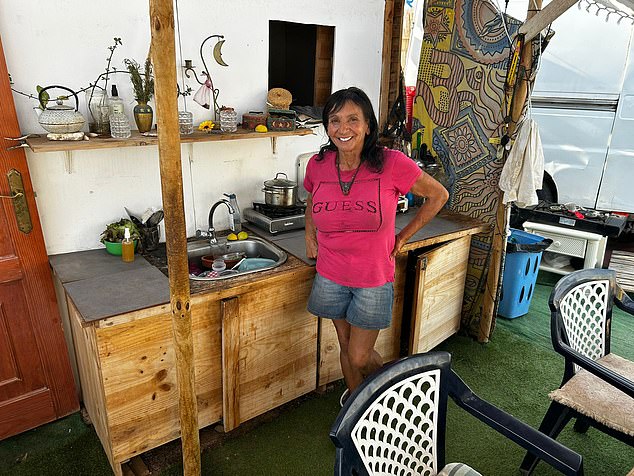
British mother-of-two Sharon (pictured), 63, lives in an encampment on a cascading hillside in Costa Adeje
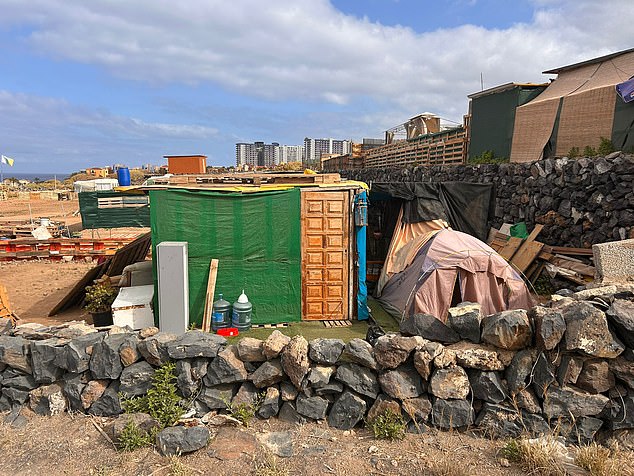
Pictured: The sprawling ‘shanty town’ in Tenerife just a few hundred metres away from luxury hotels and less than 10 kilometres from the bustling resort of Los Cristianos
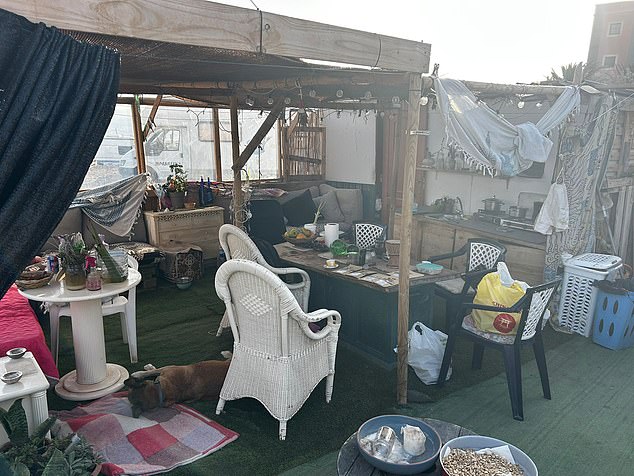
Pictured: Sharon’s home, which a fellow resident on the site built for free using scrap wood, metal and a range of other materials
‘We do love living here, it is a beautiful place, but almost none of us are here by choice,’ she told MailOnline from inside her makeshift home this week.
Sharon works part time for an excursion company, but it is barely enough to keep her afloat, especially with dogs Rocky and Baz to look after.
‘It’s a struggle at the moment, I’m only on 20 hours a week, my car rental is hundreds per month and Rocky’s food has to be fresh because he has a health condition.’
Sharon explained how she began to struggle financially following the Covid pandemic.
The Londoner moved to Spain 17 years ago, first settling in Mijas on the Costa del Sol, where she worked for a timeshare company, before moving to Tenerife just a couple of years later.
She was renting an apartment in the nearby resort of Los Abrigos during the Covid lockdown, saying she ‘paid what she could’ given the closure of the tourism trade.
But she then became the victim of a fraud after discovering her property agent had been pocketing her rent and not passing it onto the owner.
After a long back and forth with the police and her landlord, she reached an agreement to pay a sum and left.
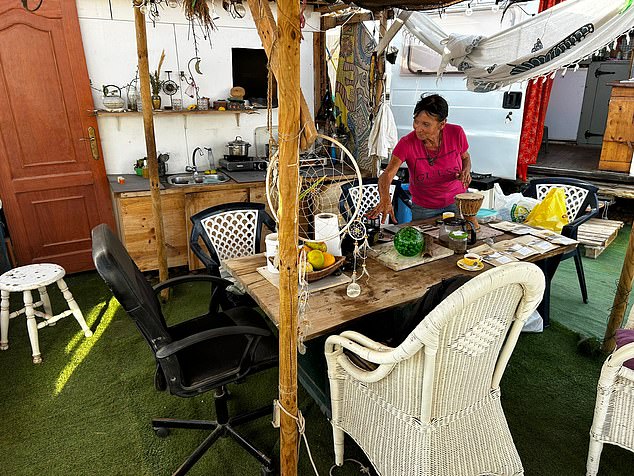
Inside Sharon’s home is a kitchen worktop, portable stove, two sofas and a dining table and chairs
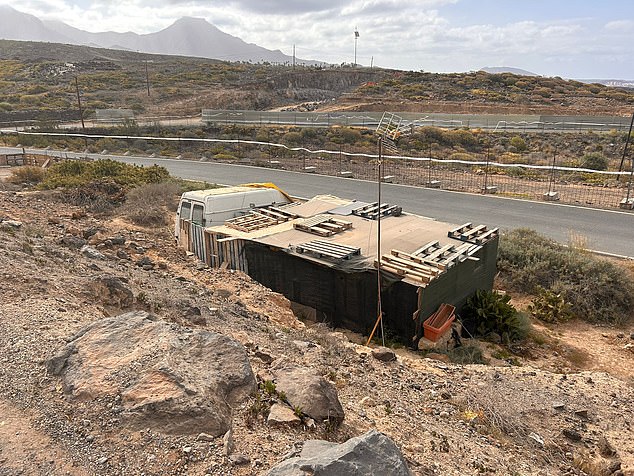
In the shadow of the five-star resort are hundreds of people living in makeshift homes, some of them just metres from the developer’s diggers
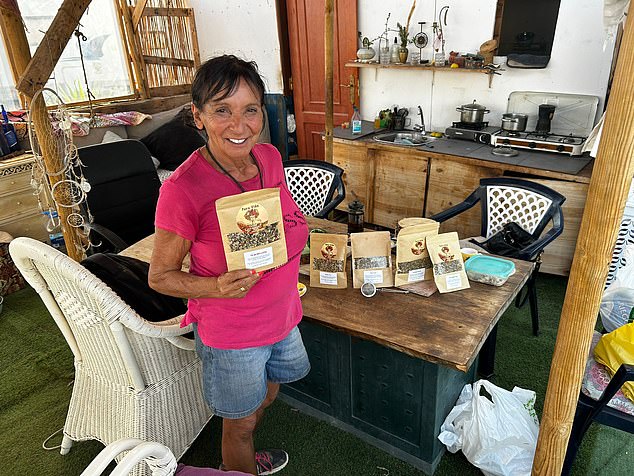
Sharon, who studied herbal medicine, makes healing creams and ointments
‘I had nowhere to go,’ she recalled, ‘I had hell trying to find somewhere to live. I was renting a room in a man’s apartment and he was horrible to me. At one point it got to the stage where I couldn’t afford to eat.’
Sharon used the last of her savings to get a campervan, so she and her dogs would at least have a place to sleep and take shelter.
‘I knew that with the way things were going I would never be able to afford to rent,’ she said.
The mother of two sons, aged 41 and 37, heard about the encampment from a friend and reserved a spot with her van little over two years ago.
A fellow resident on the site built Sharon’s home for free using scrap wood, metal and a range of other materials. Her youngest son has visited her multiple times.
The makeshift home has electricity powered by solar panels and a garden out back growing aloe vera, peppers, mangos, tomatoes and more.
Inside Sharon’s home is a kitchen worktop, portable stove, two sofas and a dining table and chairs.
There is also a little workshop where the Brit, who studied herbal medicine, makes healing creams and ointments.
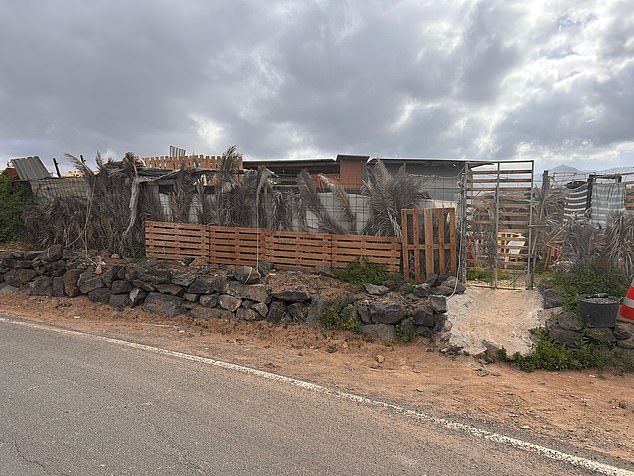
The future of the encampment could be under threat due to a five-star ‘macro-resort’ being built next door
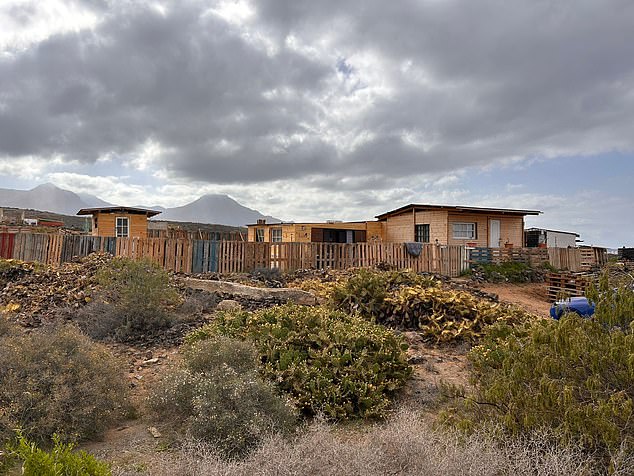
The encampment consists of a collection of mini villages, with each patch of land having a certain number of residents who organise themselves under their own rules
She also makes herbal teas and wants to set up her own business, but is being delayed by Spanish bureaucracy and the cost of acquiring the correct licences and permits.
‘This place has withstood 120km/hr winds,’ Sharon said, ‘it is not a s***hole like many people believe, we respect the land and are very strict about keeping it tidy and not polluting.
‘I recycle everything and don’t use anything with chemicals.
‘None of us have TVs here, and all I do is go to work and then come home and work on my products.’
Sharon said the residents ‘live a normal life’, with most having showers and toilets in their motorhomes – although she misses having a hot, powerful shower, and would really love an oven.
The encampment consists of a collection of mini villages, with each patch of land having a certain number of residents who organise themselves under their own rules.
A winding road snakes through the encampment down to a picturesque port.
Once a month, a man delivers water to the encampment and fills up people’s water tanks.

While the encampment is technically illegal, the authorities seem to turn a blind eye as long as there is no trouble
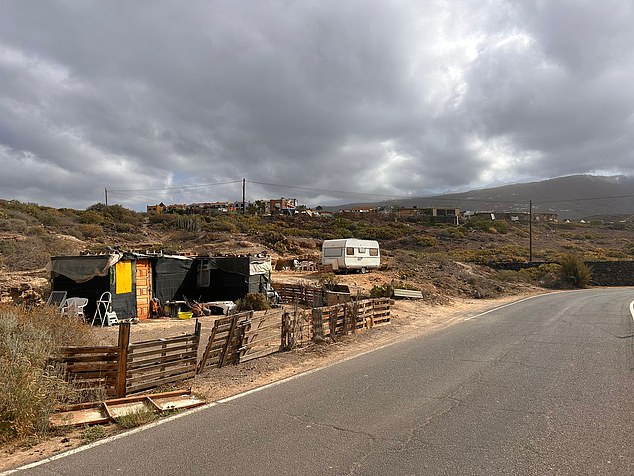
Sharon said the residents ‘live a normal life’, with most having showers and toilets in their motorhomes
Sharon’s ‘village’ is also now meeting once a month to vote on matters and raise any issues.
‘I do feel a bit more stable here but there’s still that worry that we might not have somewhere to live,’ Sharon added.
She believes the surge in tourism accommodation is one of the big reasons why sites like these are growing in number, with several other encampments existing on Tenerife alone.
She said: ‘It’s a big, big problem, people simply can’t afford to get a flat on their own.
‘I think Airbnb is to blame, once they came along that was it, after Covid it just went astronomical, although the rents were already high anyway.
‘And that’s why people are protesting, it’s mostly over the lack of housing.
‘And if you want somewhere long term, the agents want three to four months up front, which is illegal, and most people don’t have that kind of money, that’s why people are moving to places like this.’
Sharon’s neighbour and local Jose Damian, 54, is one of the newest arrivals to the encampment.
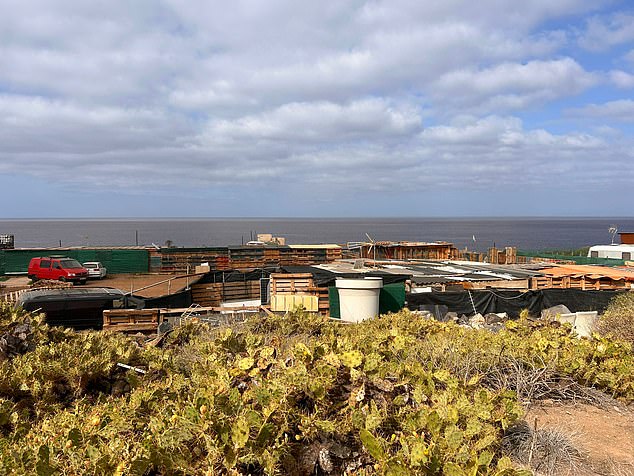
Once a month, a man delivers water to the encampment and fills up people’s water tanks
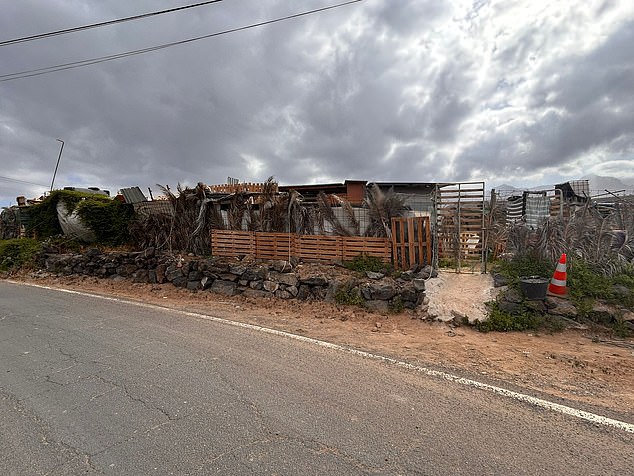
Sharon said that every few months police may come and check people’s papers, just to ensure there are no criminals hiding in the area
‘I work in construction but I don’t make enough to rent a place,’ he told MailOnline from outside his campervan.
‘It’s crazy how fast the rents are going up. Here we have people from all over Europe, many from Italy, Germany, Poland and also some Dutch.’
Russian yoga instructor Andrey Vasiliev, 58, has been living next door to Sharon for two years.
He told MailOnline: ‘It’s a great life, people need to realise that life is about being happy from within, and not from the outside by buying material things.’
Andrey teaches yoga at a nearby buddhist centre and is currently building a dome house from scratch.
He insisted the area was safe and that he has never seen any criminality during his time there.
While the encampment is technically illegal, the authorities seem to turn a blind eye as long as there is no trouble.
Sharon said that every few months police may come and check people’s papers, just to ensure there are no criminals hiding in the area.
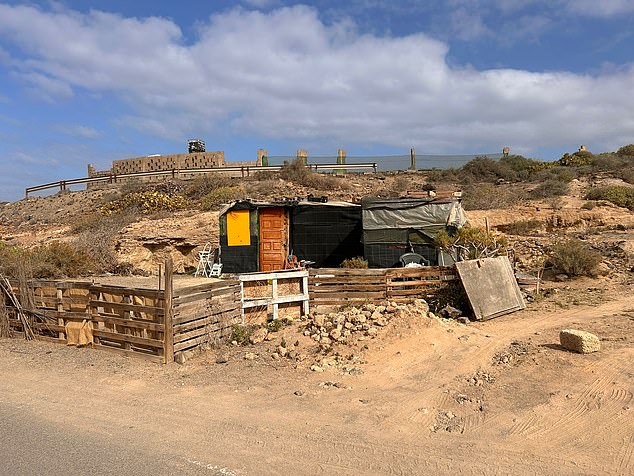
A double whammy of Covid lockdowns and a surge in Airbnb-style properties has left many with little work and few affordable places to live
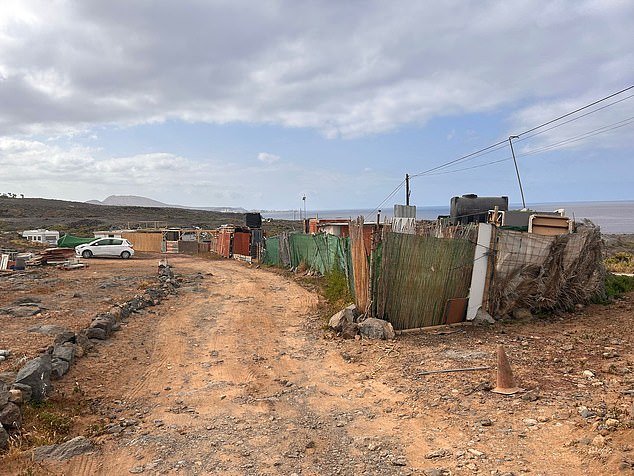
Some of the makeshift homes have electricity powered by solar panels and residents grow their own produce
But their future could be under threat by the construction of a highly controversial five-star ‘macro-resort’ next door.
The Cuna del Alma project, backed by Belgian investors, wants to build a hotel and hundreds of luxury villas on what is one the few untouched areas of natural beauty.
The building licences have been pushed through despite a fierce pushback from local activists, allegations of irregularities and even a probe by the European Commission.
In February this year, four excavators were set on fire. Activists denied being behind the arson and condemned the ‘criminal act’.
‘We don’t know what it will mean for us, but more importantly we’re devastated that they are destroying nature, and one of the last places that is totally natural,’ said Sharon.
‘They are building all these luxury hotels, and apartments all over the mountains, it’s really sad. It’s not nice to think that there’s going to be nowhere left that’s natural.’
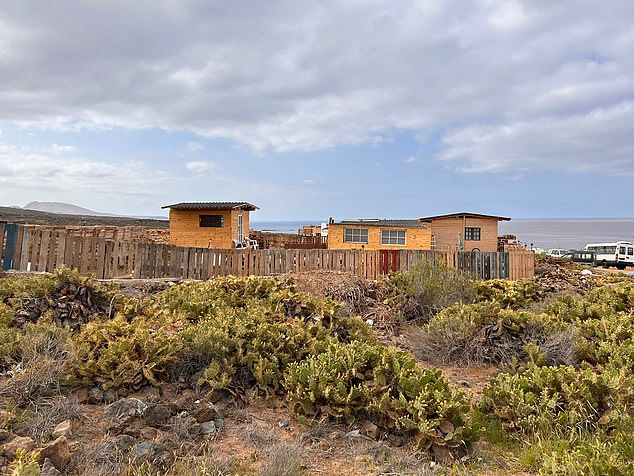
The five-star ‘macro-resort’ next door the encampment has led to scores of protests
Critics of the development, which is next to a special marine conservation zone, say it threatens native species, such as the protected plant Echium triste, and will lead to habitat destruction and increased pollution.
In 2022, the developers were fined €229,000 by the Canary Islands Government for damaging a pre-Hispanic archaeological site.
In 2023, activists claimed the Cuna del Alma was approved without a comprehensive environmental impact assessment, as required by Spanish and EU law. It led the European Commission to open a preliminary investigation that same year.
There have been scores of protests over the resort over the past few years, but construction is continuing at pace on the site.











